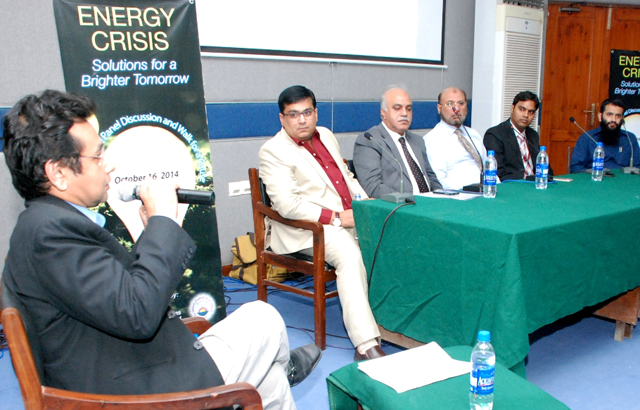The heartening feature of this timely discussion was that panelists focused both on non-renewable as well as renewable resources to overcome Pakistan’s energy conundrum. There was a general consensus amongst all the panelists that the fundamental reasons behind the current crisis included inability to see the bigger picture, absence of a long term vision, late technology implementation, wrong planning and flawed decisions related to allocation of natural resources.
The interactive panel discussion entitled ‘Energy Crisis – Solutions for a Brighter Tomorrow’ was held on October 16, 2014, at an NED auditorium and featured the University’s faculty members and SSGC’s senior officials as panelists.
The panel discussion is part of the Corporate Communication Department’s current drive aimed at seeking solutions from the academia about the prevailing energy crisis while spreading the message about the need to conserve energy to the students and faculty members. Panelists who participated in this healthy exchange of dialogue were Abdul Majid Malik, SGM (Distribution-North), Saeed Larik, GM (Distribution-Central) and Shahbaz Islam, DGM/Incharge (CCD/OD) from SSGC’s side. NED was represented by Professor Anjum Khalid (Mechanical Engineering Department) and lecturers Mr. Adnan-ul-Haq and Eng. Fahimuddin from Petroleum and Chemical Engineering departments. The discussion was moderated by Syed Imran Ahmed, Chief Manager, Corporate Communications, SSGC.
The heartening feature of this timely discussion was that panelists focused both on non-renewable as well as renewable resources to overcome Pakistan’s energy conundrum. There was a general consensus amongst all the panelists that the fundamental reasons behind the current crisis included inability to see the bigger picture, absence of a long term vision, late technology implementation, wrong planning and flawed decisions related to allocation of natural resources.
While on the topic of alternative solutions, Dr. Khalid was of the view that that solar water geysers can act as a subsitute for the conventional gas geysers for the primary aim of saving up on gas and gas bills. He said that by collaborating with a reputed institution like NED on solar water geyser project, SSGC can help promote building energy efficiency, energy conservation and space heating in a very cost effective way.
In their remarks, SSGC’s senior executives, Abdul Majid Malik and Saeed Larik sought cooperation from the general public in helping the gas utility reduce the rising UFG volumes. They asked the audience present to report any gas leakage, one of the main factors attributing to UFG, to the SSGC authorities. Mr. Malik appreciated the faculty and students of NED for working towards finding energy solutions rather than just harping on problems. NED’s faculty members Adnan-ul-Haq suggested using sea weed, found in several coastal areas of Pakistan, as a useful source of renewable energy, especially when there is dearth of fossils fuels. On the other hand, Eng. Fahimuddin while reiterating the benefits of coal gas, stressed that the key to finding Pakistan’s energy woes lay in properly utilizing coal gas in the country.
Earlier, SSGC’s DGM/Incharge (Corporate Communications) Shahbaz Islam gave a highly motivating presentation entitled ‘Changing Mindset’ to the NED students that stressed on expanding one’s vision and developing an ability to see the bigger picture. Through some relevant videos, Mr. Shahbaz pointed out that passion is a key to achieving one’s mission in life.
In his key note address, Prof. Sarosh Lodhi, Dean Civil Engineering and Architecture appreciated SSGC for its efforts in linking up industry with the educational institutions to find solutions for issues common to all. He said that despite the fact that the demand-supply situation of natural resources in Pakistan is grim, there is still hope that if we can collectively work towards proper utilization of resources through well defined policies, we can overcome the current energy impasse.
The program concluded with the conferring of mementoes to the panelists from NED by SGM (Distribution-North). Also present on the occasion were NED’s Sohail Fazil Usmani, Controller Students Affairs and SSGC’s Salman A. Siddiqui, DGM (Corporate Communications).
Headlines

